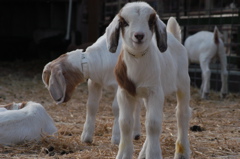Bob Judd, DVM, DABVP (Equine Medicine), DABVP (Canine and Feline Practice)
Goat kids.

Lambs and meat goats are commonly raised on improved pastures, and their major health issue is gastrointestinal parasites. Resistance to intestinal parasites is a serious problem in these animals.
A study was performed to determine resistance and to see if supplementing with protein would increase immunity against parasites. Over a 3-year period, six grazing groups were examined, comprised of 18 animals, each with six Suffolk, six Katahdin, and six goat wethers (castrated male goats).
Three groups were not supplemented, and the other three groups received whole cottonseed. Each year, all animals were dewormed with valbazen, levamisole, and ivermectin prior to the start of grazing. After the first deworming, only individual animals were given the combination of the dewormers when their FAMACHA score was three or greater.
The FAMACHA score, which is a scoring system developed and used to see if dewormers have been effective in small ruminants, is determined by checking the color of the inner eyelids and comparing that to a chart. The chart has color levels of one to five, with one showing the normal pink color of the membranes while five has almost white membranes.
Anemia or low blood count in sheep and goats, is generally caused by the intestinal parasite Haemonchus contortus. The FAMACHA score, fecal egg counts, and red blood cell counts were examined to estimate the number of parasites present and the degree of anemia.
This resulted in animals only being dewormed when the FAMACHA score was three or greater and decreases the number of animals that were dewormed.
Katahdin lambs were the most resistant to parasites. Goat kids showed to be the most susceptible to parasites, and Suffolk lambs were in the middle. Supplemental protein with whole cottonseed did seem to lower the fecal egg counts in goat kids, but it did not have an effect on Katahdin lambs.